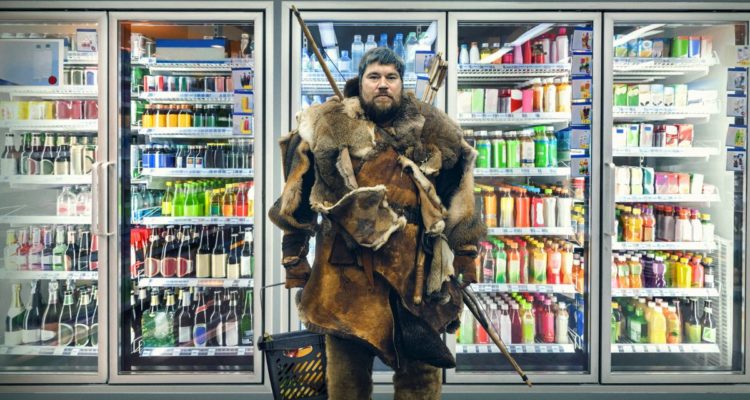A man dressed as a Viking goes into a convenience store to trade furs for groceries; a trio of smugglers is on the verge of an escape across the border when a moose totals their car; a cop calls for a tracker dog, only to be told that it, “isn’t working today.” When asked what the hound could be doing, the other cop responds honestly, “No idea. It is a dog…dog stuff, I guess?” “Wild Men” has the accoutrement of an absurdist comedy, yet it uses these moments as ramps instead of the tricks themselves, launching into an exploration of mid-life ennui, fatherhood, and what it means to be a good husband in between the chuckles. It’s a tricky balancing act, yet director (and co-writer) Thomas Daneskov manages to keep all of his plates spinning throughout the film’s tight 100-minute runtime, offering up a thoughtful meditation on “manhood” in the 21st century.
READ MORE: 2021 Tribeca Film Festival Preview: 15 Must-See Films To Watch & More
A sort of collision of worlds, “Wild Men” opens with middle-aged Dane, Martin (Rasmus Bjerg), roaming the woods of coastal Norway in homemade furs, hunting for game. When he wanders into a nearby convenience store to trade pelts for beer and cold cuts, it becomes clear that the man isn’t insane, just committed to a particular lifestyle. When Musa (Zaki Youssef) wanders into Martin’s backwoods camp the next day with a bad gash in his leg, the aspiring Viking stitches up the stranger’s wound and even offers a cell phone to call an ambulance.
Musa doesn’t want any attention from authority types, though, as an earlier scene shows him getting into a gnarly moose-related car accident with two accomplices that aren’t as dead as Musa thought (and are eager to reclaim the bag of money their departed partner took with him). When local police chief Øyvind (Bjørn Sundquist) sends a couple of deputies after the literal blood trail from the moose wreck, it leads them to Musa and Martin, the latter of whom panics when he reasons that the cops are after him for his convenience store shenanigans. Martin doesn’t realize that Musa is a wanted man with a bag full of drug money, and so he assumes that the pair must take to the mountains to start new lives (much to Martin’s delight).
On the one hand, “Wild Men” is a charming comedy of errors, with Martin, Musa, and Øyvind circling each other and the truth about what is really going on between the three of them. Yet beneath the comedy of misunderstanding and misdirection is a character drama that sees all three of the leads grappling with different stages of male adulthood. Coming in pieces and fragments via conversation and silent background details, the audience learns just enough about each to gather that they are all struggling with a larger social discussion concerning masculinity and manhood.
READ MORE: Summer 2021 Preview: Over 50 Movies To Watch
For 20-something Musa, it’s about trying to become the man he’s supposed to be for a young son that needs the money earned via drug smuggling. For middle-aged Martin, who is lying to his wife about being away at a corporate team building seminar, it’s about discovering purpose and meaning for an existence that he feels is devoid of both. For early-70s Øyvind, it’s about looking back on a life nearly complete and a dead wife he probably avoided too much: realizing all his attempts to get away, fish, and find himself were little more than distractions from what really mattered (and is now gone).
Buttressed by a madcap narrative built on half-truths and omissions of fact, “Wild Men” maneuvers through these questions about the male human experience, using each of the three leads as a mirror for the other two. As the film moves into its third act, the trio gains a more complete understanding of what it means to be not just men, but partners within a larger framework that exists beyond their petty anxieties. Structurally, Daneskov uses Martin’s new Viking lifestyle as a visual and thematic coat hook, exploring his stone age vs. modern world dichotomy as the template for many of the broader filmmaking choices.
READ MORE: The 100 Most Anticipated Films Of 2021
Just as Martin has one foot in 2021, and the other in 1021, so too does the film balance the majestic, uninterrupted vistas of Norway with dingy motels and joyless hybrid vehicles. Elsewhere, juvenile shoplifting outbursts butt up against interrogation torture scenes, and just when it seems like Martin’s detour from reality is consequence-free, his wife, Anne (Sofie Gråbøl), arrives with the kids to remind their patriarch that they have feelings and needs as well. It’s all done subtly, however, and a score that mostly stays out of the way makes room for diegetic needle drops that wrap the whole effort in an earnest blanket that manages the tone (and these juxtapositions) well.
Bolstered by tone-perfect performances from all three of the leads, and a script that hides larger themes within the body of the narrative like vegetables in mashed potatoes, “Wild Men” hits with the force and precision of an arrow fired from Martin’s homemade bow. And while the tone of the film toys with the absurd, what it has to say about masculinity, regret, and what it means to belong is anything but. [A-]
Here’s an exclusive teaser from “Wild Men.”
Follow along with all our 2021 Tribeca Film Festival coverage here.

